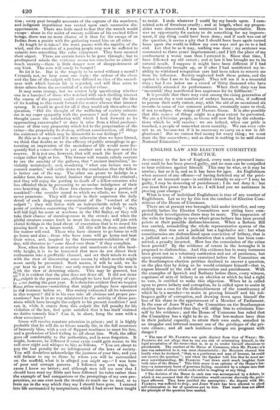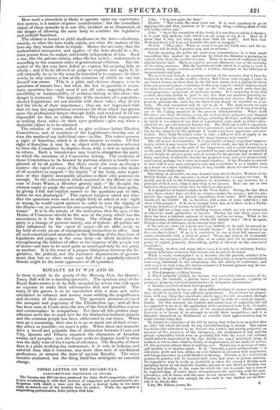ENGLISH LAW AND ELECTION COMMITTEE PRACTICE.
ACCORDING to the law of England, every man is presumed inno- cent until he has been proved guilty, and no man can be compelled to bear evidence against himself. This may be wise, or it may be unwise; but so it is, and so it has been for ages. An Englishman when accused of any offence—of having forfeited any of the privi- leges of an innocent inan—is entitled virtually to say—" I may be guilty, I may be deserving of punishment ; I do not deny it : but you must first prove that it is so; I will lend you no assistance in proving your charges."
What is true of individual Englishmen is true of any number of Englishmen. Let us try by this test the conduct of Election Com- mittees of the House of Commons.
There are at present two boroughs laid under interdict, and very probably before the Election Committees now sitting have com- pleted their investigations there may be more. The suspension of the writs for boroughs in cases where gross bribery has been proved points at their possible disfranchisement. When a Reform Bill was carried, remodelling the whole representative system of the country, that was not a judicial but a legislative act : but when constituencies are disfranchised upon conviction of bribery, that is a judicial act—a judicial declaration that a crime has been com- mitted, a penalty incurred. How has the commission of the crime been proved ? By the evidence of voters in the boroughs it is proposed to disfranchise. And this evidence has in many instances been given not as a voluntary confession and act of penitence, but upon compulsion. A witness examined before the Committee on the Southampton election petition declined to answer a question, on the plea that by doing so he would criminate himself—that is, expose himself to the risk of prosecution and punishment. With the examples of Ipswich and Sudbury before them, every witness, cognisant of acts of bribery in an election at which he had a right to vote, is entitled to make this objection. When he is called upon to prove bribery and corruption, he is called upon to assist in making out a case for the disfranchisement of the constituency of which he is a member—to assist in proving himself and his col- leagues guilty of corruption, and drawing down upon himself the loss of his share in the appointment of a Member of Parliament. In the case of Joins WREN,* the Committee on the Southampton election have declared that they will oblige him to criminate him- self by his evidence ; and the House of Commons has ruled that the Committee has a right to do so. Our law-makers have thus in their judicial capacity, to attain their own ends, annulled in an irregular and informal manner one of the privileges of the pri- vate citizen; and all such insidious changes are pregnant with dangerl- * The case of Mr. FLEMING was quite distinct from that of WREN: Mr. FLEMING did not allege that he ran any risk of criminating himself, in the legal acceptation of the term—that is, so as to render himself obnoxious to punishment. The conduct of the House of Commons, when Mr. FLEI411,0'5 case was submitted to it, was most characteristic : the Members cheered him loudly when he declared, "that, as a gentleman and man of honour, he could not answer the question "; and when the Speaker told him that he must an- swer notwithstanding, Mr. FLEMING "sat down amid much laughter from both sides of the House." This little scene is an epitome of the House's his- tory—a momentary burst of generous feeling, succeeded by a relapse into that habitual state of ennui which seeks relief in laughing at any thing.
f The decision of the House in each case was accompanied by a debate, in which it was assumed that the Committee would exercise discreetly the privi- leges affirmed. They have justified the assumption : the dispute with Mr. FLEstuto was suffered to drop ; and Joust WREN has been allowed to plead self-crimination in bar of questions put to him. That result does not affect the principle of the question here mooted.
How such a precedent is likely to operate upon our representa- tive system, is a matter of grave consideration : but the immediate object of these remarks is to use this incident as an illustration of the danger of allowing the same body to combine the legislative and judicial functions.
The citizen is bound to yield obedience to the laws—obedience, namely, to what the laws really enjoin, not what the makers of the laws say they meant them to enjoin. Hence the necessity that the authoritative interpreter and applier of the laws should be a dis- tioct person from its maker, and totally independent of him. Such a one, like the private citizen, takes the law as it is ; understands it according to the common rules of grammatical criticism. But the maker of the law may have failed to express his meaning fully or clearly ; and if he be allowed as judge to explain and apply it, he will naturally do so in the sense he intended it to express—in other words, he may enforce a law of the existence of which no one but himself was aware. This is a plain and obvious danger, even in questions of statute law ; but when the law in question is custo- mary unwritten law—and most if not all rules regarding the ad- missibility or inadmissibility of evidence belong to this class—the danger is increased. The majority of the members of a popularly- elected Legislature are not familiar with these rules ; they do not feel the whole of their importance ; they are not impressed with that (it may be) superstitious reverence for them which has grown upon the professional lawyer through habit, and rendered it all but impossible for him to violate them. They feel little repugnance at making these rules—in their eyes pedantic—give way when a desirable object is to be attained. The relation of voters called to give evidence before Election Committees, and of members of the Legislature—leaving out of view the merits of any individual case—is this. The voters possess a right of franchise, which it is their interest to retain. Of this right of franchise it may be an object with the members selected to form the Committee to deprive them, with a view to transfer it to others. Such a transference may tend to strengthen the party to which the members of a Committee belong. The tendency of these Committees to be biassed by partisan objects is loudly com- plained of by all parties. But there needs not even so strong a motive: the esprit de corps of the House of Commons—the desire of all members to support " the dignity" of the body, since a por- tion of that dignity necessarily attaches to their own persons—is enough. In the conversation which occurred in the House on the case of JOHN WREN, a Member gravely said—" He thought the witness ought to purge the contempt of which he had been guilty, by giving a full and explicit answer to the questions put to him, before he was discharged." This sapient lawgiver cared not whe- ther the questions were such as might fairly be asked or not : right or wrong, he would extort answers in order to save the dignity of the House—or, to preserve his own comparison, "to purge the con- tempt." It is in the nature of the institution that the acts of the House of Commons should be the acts of the party which has the ascendancy in it for the time being. The change from party to party is a change of persons merely, not of system : all parties are alike influenced by the esprit de corps—all are alike ready to lay hold of every means of strengthening themselves in office. And all such constitutional anomalies as the blending of the functions of legislators and judges in the same body—as afford facilities for strengthening the holders of office at the expense of the people out of doors—are sure to be used quite as unscrupulously by one party as another. It is the want of a proper distinction between the le- gislative, the judicial, and the executive departments of govern- ment, that has so often made men feel that a popularly-elected Senate might be the most oppressive of all tyrannies.



























 Previous page
Previous page